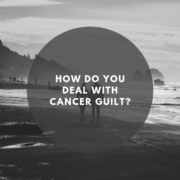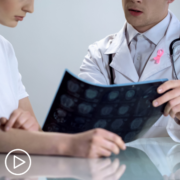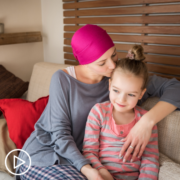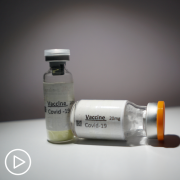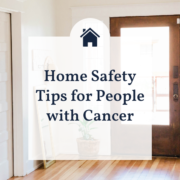How Do You Deal With Cancer Guilt?
It may come as a surprise to those who have not experienced cancer to learn that many cancer survivors suffer a form of “survivor guilt.” Survivor guilt is most often associated with a reaction to surviving a traumatic event that others have died in, for example, survivors of combat, terrorist attacks, natural disasters, or air crashes. Survivors feel guilty that they have survived the trauma and others – such as their family, friends, and colleagues – did not.
When the Diagnostic and Statistical Manual of Mental Disorders IV (DSM-IV) was published, survivor guilt was removed as a recognized specific diagnosis and redefined as a significant symptom of post-traumatic stress disorder (PTSD).
It seems clear to me that a diagnosis of cancer fits both the description of survivor guilt and PTSD too. Cancer is a traumatic experience and no-one who survives treatment comes out the other side unscathed. As so many of us know, the end of treatment is not the end of dealing with cancer. When we’re going through treatment, we are simply trying to survive and don’t really feel the full emotional impact that being diagnosed with cancer involves. It’s often only when treatment ends, that the full impact hits us.
Cancer Related Guilt is a Complex, Multi-Faceted Emotion
We may feel guilt at “surviving” when others have not. Dee Sparacio writes of her feelings at a time when a friend’s husband died. “How could I face my friend? How could I, NED [No Evidence of Disease] for 5 years since my recurrence face my friend. Would she look and me and think – why are you still here and my husband is gone?”
Karin Sieger also describes her experience of feeling guilty after a relative died from cancer. “A few years after my first cancer treatment, the terminal cancer diagnosis of a relative of mine, her gradual and then very quick deterioration and death filled me with the old feeling of guilt,” she writes. “In the presence of the bereaved mother my own mother felt guilty that her child is still alive. Cancer guilt can happen to anyone affected by cancer, including relatives and friends.”
We might feel guilty that our lifestyle choices somehow contributed to a cancer diagnosis. If we have discovered we carry the BRCA1/2 gene, we may feel guilty that we could pass this gene mutation on to our children. On her blog, Audrey Birt describes how “breast cancer guilt has stalked me. Even when I’ve thought I’d put that beast to rest, up it pops in various guises. My guilt as a parent for causing my family to suffer has been a long term one. Carrying the BRCA2 gene tipped me again into a spiral of grief and guilt but somehow staying with that and recognizing that for what it is has helped me move through it.”
Cancer Guilt May Arise During Any Stage
I have also heard from patients diagnosed with an earlier stage disease, and patients who didn’t have to go through chemotherapy that they felt less “deserving” of sympathy. One of my blog readers wrote, “I felt like a fraud when diagnosed as in I didn’t need chemo just surgery, radiation and tamoxifen so I didn’t want to make any fuss when so many others had REAL cancer.”
Guilt may also arise from a sense that what I’m doing with my life must have greater meaning if my survival is to be justified. Another of my blog readers commented, “I feel guilty that I am not making more of my life. When I was going through treatment, I made all sorts of plans for what I would do when I finished. I was really going to make the most of my life, now that I’ve been given a second chance…but I am too tired and overwhelmed to do any of those things.”
If any of this sounds familiar to you, you are not alone. Feeling guilty at surviving cancer is a common experience and a perfectly normal reaction to what you have gone through. When I asked the question of my breast cancer community on Twitter “how you deal with survivor guilt?” I received some great answers. I hope you will find comfort and practical advice in the quotes below.
“Cancer guilt was related to my family. Years before my diagnosis, my dad died of cancer. So they all had to do it again with me though a different situation. I felt huge guilt about my dad for not understanding. Counseling helped a lot. I would recommend counseling for sure. Or friends who listen and allow you to air the emotion.” Julia
Survivor’s Guilt
“I do feel a certain amount of “survivor’s guilt” since my cancer was stage 0 and no chemo or radiation-just surgery. Volunteering at a cancer support center helps me and inspires me filling me with hope – witnessing patients fortitude and determination to regain their health is so inspiring.” Susan
“The survivor guilt I felt was a sense of discomfort. I was quite possibly picking up someone else’s anger, frustration and despair at their own situation. But it is their situation, not mine. And since my second diagnosis I certainly have nothing to feel guilty about or to apologize for. We have a choice not do guilt, and also do not need anyone else to do guilt for us.” Karin
“As I’ve lost friends and colleagues to breast cancer I’ve grieved for them with an added complexity. What made the difference? Why did I survive and not them? In some ways I’m embarrassed I’m still here, four diagnosis later. It’s a form of madness to feel guilty you haven’t died, to feel guilty your treatment isn’t as bad as others, to feel guilty you’ve survived more than 20 years since your first diagnosis. I know it makes no sense but it’s easy to carry guilt along with everything else. But it serves no purpose and is fueled by a media that feeds a view of the cancer experience which is unrealistic, overly simplistic and laden with judgment.” Audrey
Overcoming Cancer Guilt
In his book, Travelling Light (The Columba Press) Daniel J. O’Leary quotes Bearwatcher, an Apache medicine man. “In the Apache language there is no word for ‘guilt.’ Our lives are like diamonds. When we are born we are pure and uncut. Each thing that happens to us in our lives teaches us how to reflect the light in the world; each experience gives us a new cut, a new facet in our diamond. How brilliantly do those diamonds sparkle whose facets are many, to whom life has given many cuts.”
So when you experience those feelings of guilt, contemplate the brilliant new facet in your diamond and reflect on the way that you can reflect that light in the world. You will best honor the memory of those friends who have died, by looking to the future and pledging to make the best life you can for yourself and those you care about. Life is a precious gift and you have been given the opportunity to recommit yourself to it. Now is your time to live; so armed with the lessons you have learned from your cancer experience, look to the future and shine with the brilliance of your diamond light.
Did you find this blog post useful? If so, please consider donating so that we can continue to provide valuable content.
Resource Links:
Karin Sieger
Is there a hierarchy among cancer survivors?
Twitter Comments:

A Stanford Medicine X e-Patient scholar, Marie Ennis O’Connor is an internationally recognized keynote speaker, writer, and consultant on global trends in patient engagement, digital health and participatory medicine. Marie’s work is informed by her passion for embedding the patient voice at the heart of healthcare values. She writes about the experience of transitioning from breast cancer patient to advocate on her award-winning blog Journeying Beyond Breast Cancer.

